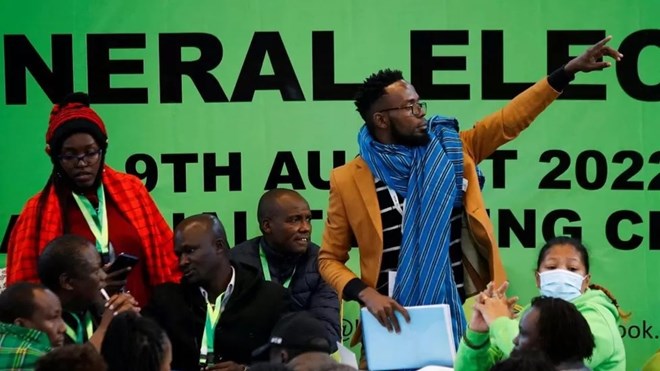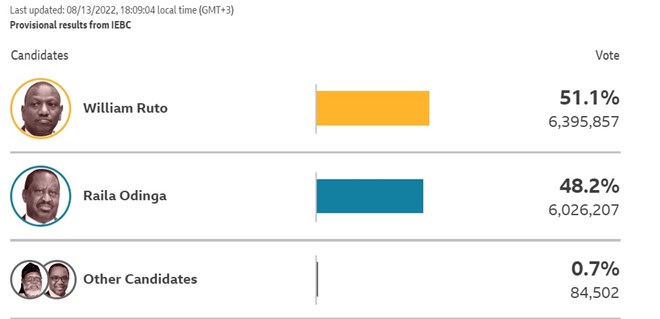
Sunday August 14, 2022
By Dickens Olewe

The verification of results has been stopped several times after complaints by supporters of the main candidates. REUTERS
With more than a third of the results from Kenya's presidential election now confirmed, the two main candidates are running neck and neck.
Deputy President William Ruto has taken a slight lead over ex-Prime Minister Raila Odinga Deputy - 51% against 48%.
The head of the electoral commission has admitted that announcing the result of Tuesday's election is too slow.
The verification of results has been stopped several times after complaints by supporters of the main candidates.
Mr Odinga's supporters have disrupted the result verification process several times and accosted some of the electoral officials, accusing them of tampering with the vote.
Amid the melee, Mr Odinga's chief campaign manager was able to get to the lectern used by top electoral commission officials, where he criticised the result verification process.
"I want to announce to the nation that Bomas of Kenya is a scene of crime" said Saitabao Ole Kanchory, before the microphone was switched off and he was led away. Bomas is the name of the cultural centre in the capital, Nairobi, which is being used as the main tallying centre.
Riot police have been deployed inside the building to reinforce security.
The results of 141 of the 292 constituencies have now been officially verified.
Previously, media organisations have been releasing provisional tallies using official data from the 46,000 polling stations. They also show a tight race between the two candidates.
About 14 million votes were cast - a turnout of 65%.
The electoral commission has until Tuesday 16 August to declare the winner.
"We have to make adjustments" to quicken the process of verifying results, the head of the electoral body Wafula Chebukati said in his latest briefing on Saturday.
"It's taking three to four hours" to process the result from a single constituency, he said. "Some of our returning officers have stayed here for three days sitting on chairs which is totally unacceptable."

"We believe that this will fasten the process and we should be able to dispose of the returning officers in the course of today," Mr Chebubati said.
Extra police officers have also been drafted in.
Media tallies of results from more than 46,000 polling stations - posted on the electoral commission's website - have also caused some confusion in the country because the counts didn't match.
Officials denied claims on social media that fake results had been posted after the system hosting the results was hacked.
"Nothing like that has happened. It is misinformation," said the electoral commission's CEO Marjan Hussein Marjan.
What is happening at the main tallying centre?
Officials from the Independent Electoral and Boundaries Commission (IEBC) are still busy verifying results at the Bomas cultural centre.
Security has been enhanced at the venue and access to the compound is limited.
Electoral officials are comparing photographs of result forms from the polling stations to physical forms that officials have brought to the centre to ensure the results match.
This painstaking effort has seen Mr Chebukati accuse agents from the main parties, who are witnessing the process, of turning a straightforward exercise into a "forensic" one.
How are Kenyans feeling?
There is a sense of anxiety in the country as disputed elections in the past have led to violence or the whole process being cancelled.
Following the 2007 vote, at least 1,200 people were killed and 600,000 fled their homes following claims of a stolen election.
In 2017, huge logistical errors led the Supreme Court to annul the result and order the presidential poll to be re-run.
Officials are under pressure to get things right this time.
The country often grinds to a halt during elections, activities across the country have slowed and schools remain closed at least until next week on Monday. In Nairobi's central business district, the usually busy streets are mostly deserted.
Allegations of election rigging are as old as the country. It was part of politics even before multiparty elections were re-introduced in the 1990s, but the push for free and fair elections has never faltered.
After the violence that followed the 2007 election, political parties and activists argued for the use of technology instead of physical registers, which could be easily manipulated, to verify voters.
This year's election is the third time technology has been used but it has yet to deliver an election that has not been challenged in the courts.
When will we know the result?
It's unclear when the final results will be known, but the electoral commission has ramped up the verification of the results.
If there is a clear leader of the race, celebrations are likely to break out - but only the IEBC can make it official.
To win the presidential race in the first round, a candidate needs:
- more than half of all the votes cast across the country
- at least 25% of the votes cast in a minimum of 24 counties.
- Otherwise voting goes to a second round which by law has to happen by 8 September.